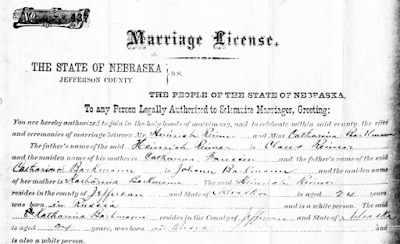Cemetery Records. Most courthouses have a list of cemeteries in the county, including small and private cemeteries and single burials, most commonly in the county clerk's office. Don't miss the chance to find your ancestor's grave.
School Records. As recently as half a century ago, counties were blanketed with rural school districts. The county clerk may have records from these school districts, including censuses of school-age children, board meeting minutes, and even children's grades, although many have been lost or destroyed. Was your ancestor on the school board? You'll need to find a map of school districts for the county to figure out which school your ancestor attended. Here is an example I found when my grandmother Elisabeth (Suderman) Fast was listed among the school-age children of Paris School District #23 in Harvey County, Kansas, in 1898.
 |
| Census of School Population, 30 July 1898, Paris School District #23, Harvey County, Kansas, Register of Deeds, Courthouse, Newton. |
Criminal and Civil Court Records. I suspect that far more of our ancestors were involved in criminal and civil cases than we realize today. Occasionally these records are indexed, but far more often they are unindexed and located in dusty volumes in a vault. If there is an index, I always check it for my ancestors. On the rare occasion that I know that they were involved in a case, I will search for it, but this is usually a hard set of documents to search.
Vital Records. Sometimes counties kept vital records of births, marriages, and deaths before the official state-mandated recording began; so these may be the only official source for these events. For example, I found the marriage license for my great-grandparents Heinrich F. Reimer #317342 (1856-1923) and Katharina Barkman #317343 (1856-1943), who were married on 5 February 1880. Nebraska did not keep state marriage records until 1909, but Jefferson County started in 1864.
 |
| Marriage license of Heinrich Reimer and Catharina Barkmann, 5 February 1880, Jefferson County, Nebraska, No. 473437, County Clerk's Office, Courthouse, Fairbury. |
While you are in town, make sure to visit the genealogy room at the city or county library and the local historical museum. They may have city directories, farm directories, newspaper clippings, town and county histories, family histories, collections of local letters and diaries, photographs, and much, much more. Go to the church where your ancestor worshiped to look at their records. If you still have relatives, even distant cousins, in the county, connect with them as they may have valuable records and stories that need to be written down as well.
By now you should have at least a week's worth of research to do in any county where your ancestor lived. Good luck and happy hunting!
No comments:
Post a Comment